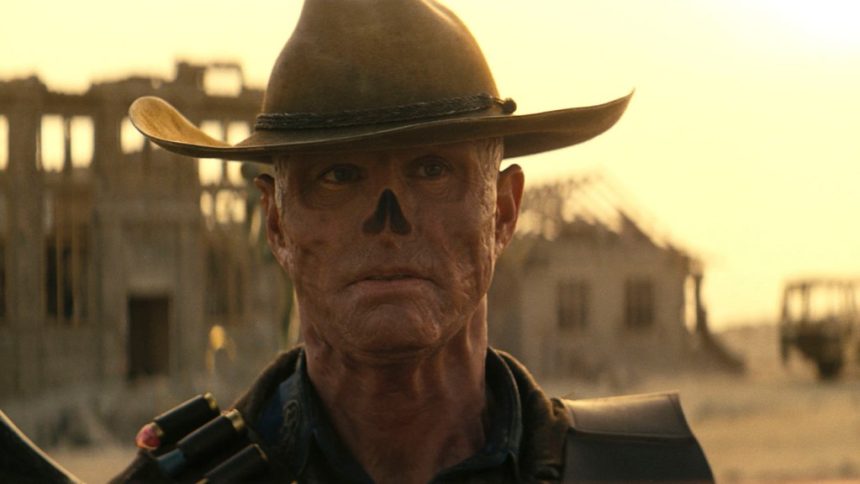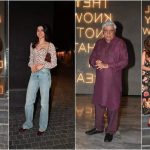Prime Video’s adaption of the Fallout game franchise is looking like a hit.
The first season of the sci-fi action-comedy has opened this week to a 92 percent average positive review score on Rotten Tomatoes (which is just shy of HBO’s post-apocalyptic video game adaptation, The Last of Us). The first season — which seems very likely to earn a speedy renewal — has been a five-year labor of love from showrunners Geneva Robertson-Dworet (Captain Marvel) and Graham Wagner (Silicon Valley) who, along with executive producers Jonathan Nolan and Lisa Joy, have brought the game’s world of a Wild West wasteland to life.
The secret to the show’s success seems to be successfully capturing the game franchise’s tricky balance of drama, graphic violence and off-beat humor — something plenty of Western projects have tried and failed to do the in the past (remember Will Smith’s Wild Wild West?). “I think we’ve seen a lot of big-scoop science fiction television in the last 10 years, and something happened along the way where you can get white-knuckled when you’re spending so much money and it becomes a very serious exercise,” Wagner says. “I feel like this stayed whimsical, stayed fun, and doesn’t take itself too seriously. Hopefully that feels like a new swing in this space and becomes the weirdest version of it. ”
Robertson-Dworet adds, “I love that the games make the apocalypse fun and weird, and I hope that’s something that we properly brought to the screen.”
Below the duo, interviewed last week, take a few questions about the show — such as how Fallout evolved over the course of its development, what kind of violence was considered too extreme, and what lessons they learned from their Westworld veteran director Nolan.
***
So how did the show creatively evolve from what you were originally thinking to where it ended up?
GENEVA ROBERTSON-DWORET What’s crazy to me is how many things actually remained true throughout these five years. A really fundamental idea Graham and I always thought about was that it’s the mix of comedy and drama that makes Fallout so special. We stayed true to that throughout the process and cared enormously about being very faithful to the mythology.
GRAHAM WAGNER I think what evolved was the [style] of comedy in this world. It’s not topical humor, right? I love Family Guy as much as the next guy, but we’re not doing that. So when we say “comedy,” we mean the ways in which the show is odd and unexpected — not necessarily zingers. We played with all versions of this. There were zingers in the script and we were like, “Is the show this?” We found ourselves taking out a lot of the more classic jokes and just leaning into the premise itself, because there’s an absurdity to it. Taking an absurd premise and playing it with a relatively straight face felt like the best way to do it.
The scene early on where you have a seemingly tough solider in his weapon-heavy power armor turn into total coward when he was attacked by a bear had me laughing out loud. I had never seen a show build up a hulking armored suit only to completely subvert it.
ROBERTSON-DWORET That’s what’s fun about Fallout, we can either lean into the genre conventions or poke fun at them.
What was the toughest writing challenge when cracking this?
ROBERTSON-DWORET Nailing that tone that we were discussing. We locked in on the idea of three central characters very early. We’re really drawn to a vault dweller (Ella Purnell), a member of the Brotherhood of Steel (Aaron Clifton Moten) and a Ghoul (Walton Goggins). We were very inspired not just by The Good, the Bad and the Ugly, but by a specific interpretation of The Good, the Bad and the Ugly that Graham has.
WAGNER It’s my interpretation, and I know it’s wrong. But it’s the idea if the same cowboy has been in the Wild West, then the longer you’re out there, that they start as [Clint Eastwood’s hero] Blondie and you end up as [Eli Wallach’s villain] Tuco. That’s sort of our view of Lucy, Max and the Ghoul. Their worldview and ethical compass gets damaged by the amount of time they’ve spent out [in the wasteland].
So you either die a hero, or you live long enough to see yourself become the villain. Speaking of, what specific advice did you get from [director and executive producer] Jonathan Nolan along the way, given his vast experience with-sci fi TV?
WAGNER This is more probably for me than Geneva — she’s most used to used to the idea of “anything’s possible.” I’ve learned to artfully cut corners in the half-hour comedy space. I had to turn off the part of my brain that says “you can’t do that” and listen to Jonah and Geneva and swing big at times. That was a big one for me to adjust to.
ROBERTSON-DWORET I spent 10 years writing big studio feature films and the reality of the feature side is, you’re not that involved. When you you create and run a TV show, you’re involved in every step of the process. I was really grateful to Jonah as a mentor to me. The main thing I learned was how much he loves to do things practically. We built an incredible amount for this show. Graham and I always talked about how the power armor will be a [CGI] effect. But no. We built power armor and had dudes walking around in power armor on set, which was amazing. I love the effect and you can totally tell the difference.
WAGNER It was a humbling moment when I asked if I could put on the power armor and the stunt team just politely told me that I’m not physically strong enough.
ROBERTSON-DWORET I didn’t even ask.
You have a lot of fun with graphic violence in the show. I’m curious, what was something you decided not to do? An example where you said, “Let’s draw a line here.”
ROBERTSON-DWORET We wanted the violence to feel very heightened and Tarantino-esque. Stylized. So anything that felt too real, anything that felt too real world … that was a line we did not pass. This is an adaptation of a violent video game. Violence is certainly part of the game and the mythology of what this world is. But we want it to exist in another world. It’s very intentionally heightened. It’s not the violence of our world.
Walton Goggins is always such a kick. What surprised you most about working with him?
WAGNER It was such a pie-in-the-sky idea. It’s a game we play in the writers room: How would you make this something that you would watch? We’re as cynical of viewers as anybody. And you’re like, “Well, if Walton Goggins is playing a Ghoul, I’d watch that.” Then we wrote it that way. It was a wild ambition, just scheduling alone. This is a guy people want to work with and for good reason. Like every one of our cast members, we’re just so lucky to have them.
What is your favorite iteration of Fallout and your favorite non–Fallout game?
WAGNER The world of the Fallout fandom is like mirroring the world of the games, they’re broken into factions. I want to keep that to myself, because there are elements of all the games in this show. We’re trying to stick to a world in which they all exist.
ROBERTSON-DWORET Gamers have thousands of hours to enjoy each Fallout game. We have eight hours to bring in viewers, introduce them to this world, and tell a story. My interpretation of the Brotherhood slightly evolves over the course of the games. We lean into one interpretation in this season, but it would be lovely to be able to explore some of the other aspects of it in later seasons.
That game also has a new story and new cast each season. Will the show do the same?
ROBERTSON-DWORET We don’t want to do too many spoilers, but we are ideating right now on a potential season two. Fans should look forward to the finale as a little flick towards what we’re going to do with a potential second season.
Hmm, let me guess: New Vegas for season two?
ROBERTSON-DWORET Well, that would be a big spoiler. Thank you for the idea, though.
I’m certain you don’t need my help!
Fallout is now streaming on Prime Video. Previous: Jonathan Nolan Is Ready to Unleash ‘Fallout’ and Finish ‘Westworld.”












